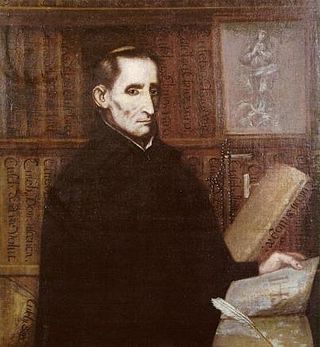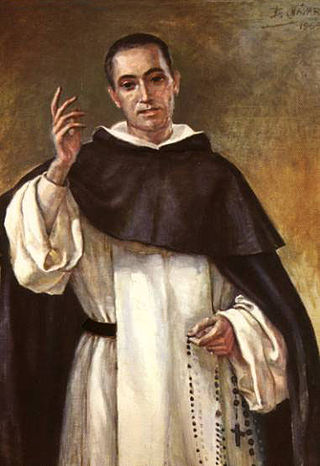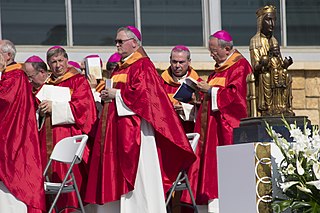Related Research Articles

María Ascensión Nicol y Goñi, O.P., was a Spanish Roman Catholic religious sister of the Third Order of St. Dominic. She co-founded and was the first Prioress General of the Congregation of Dominican Missionary Sisters of the Rosary, which she helped to found in Peru.

Juan Eusebio Nieremberg y Ottín was a Spanish Jesuit, polymath and mystic.
San Bartolomé Milpas Altas is a town and municipality in the Guatemalan department of Sacatepéquez.

Sumpango is a town, with a population of 28,488, and a municipality in the Guatemalan department of Sacatepéquez.

Blanche of Portugal, was an infanta, the firstborn child of King Afonso III of Portugal and his second wife Beatrice of Castile. Named after her great-aunt Blanche of Castile, queen of France, Blanche was the Lady of Las Huelgas, Montemor-o-Velho, Alcocer and Briviesca, the city which she founded.
Emilio García Gómez, 1st Count of Alixares was a Spanish Arabist, literary historian and critic, whose talent as a poet enriched his many translations from Arabic.
Dominican Republic literature has a long and interesting history.

Francisco Coll Guitart, OP was a Spanish Catholic priest of the Order of Preachers and founder of the Dominican Sisters of the Annunciation of the Blessed Virgin.
Ángel Martínez Casado and died in Virgen del Camino, León Province, Spain, 03/04/2024) was a Dominican friar and PhD in History and Theology. He received humanistic and religious education at La Virgen del Camino College, from where he entered the novitiate in the Dominican Order in October 1965, in Palencia. He began his religious studies in Las Caldas de Besaya (Santander) and Salamanca, where he made solemn religious profession in 1973.
The Monastery of the Mother of God is a convent of Dominican nuns sited in Olmedo, Valladolid Province, Spain. It was founded in 1528 as a beaterio (beguinage), under the title of Sta. Catalina, under the protection of Doña Francisca de Zuñiga, abbess of San Paio, Santiago.

The 522 Spanish Martyrs were victims of the Spanish Civil War beatified by the Roman Catholic Church on 13 October 2013 by order of Pope Francis. It was one of the largest number of persons ever beatified in a single ceremony in the Church's 2000-year history. They originated from all parts of Spain. Their ages ranged from 18 to 86 years old.
María Cristina Pineda Suazo (1954) is a Honduran astronomer, physicist, civil engineer, professor, and scientific investigator. She was Director of the Astronomical Research Center (CEACS-UNAH), and currently serves as dean in the Faculty of Spatial Sciences (FACES) at the Universidad Nacional Autónoma de Honduras. She belongs to several scientific organizations, including the International Astronomical Union (IAU), the Asamblea de Astrónomos de América Central (AAAC), and the Fundación Salvador Moncada para el Avance de la Ciencia. Pineda also serves as President of the National Committee for Astronomy in Honduras.
The Carmelite Sisters of Charity is a religious institute of pontifical right whose members profess public vows of chastity, poverty, and obedience and follow the evangelical way of life in common.
The 104th Mixed Brigade was a unit of the Spanish Republican Army created during the Spanish Civil War. Throughout the war it acted on the Extremadura, Aragon and Catalonia fronts.

Andrés Gabriel Ferrada Moreira is a Chilean archbishop of the Catholic Church. Since 8 September 2021 he has been the Secretary of the Congregation for the Clergy, where he had worked since 2018. From 2006 to 2018 he worked in his native diocese of Santiago de Chile.

Mariana of the Most Holy Trinity, OSsT whose given name was Mariana Allsopp González-Manrique was a Mexican religious sister in the Roman Catholic Church who co-founded the congregation of the Trinitarian Sisters of Madrid with Francisco de Asís Méndez Casariego.
References
- ↑ Gómez García, Vito T. (2009). El padre Coll, dominico: Francisco Coll y Guitart, santo fundador de las Dominicas de la Anunciata. EDIBESA, Madrid, cap. XIII
- ↑ Gómez García, Vito T. (2009). El padre Coll, dominico: Francisco Coll y Guitart, santo fundador de las Dominicas de la Anunciata. EDIBESA, Madrid, p. 331
- ↑ Equipo de investigación del carisma. Compendio de historia de la Congregación HH. Dominicas de la Anunciata. HH. Dominicas de la Anunciata, p. 90.
- ↑ Equipo de investigación del carisma. Compendio de historia de la Congregación HH. Dominicas de la Anunciata. HH. Dominicas de la Anunciata, p. 101ss
- ↑ Equipo de investigación del carisma. Compendio de historia de la Congregación HH. Dominicas de la Anunciata. HH. Dominicas de la Anunciata, p. 161ss
- ↑ Equipo de investigación del carisma. Compendio de historia de la Congregación HH. Dominicas de la Anunciata. HH. Dominicas de la Anunciata, p. 213ss
- ↑ Equipo de investigación del carisma. Compendio de historia de la Congregación HH. Dominicas de la Anunciata. HH. Dominicas de la Anunciata, p. 261s
- ↑ Equipo de investigación del carisma. Compendio de historia de la Congregación HH. Dominicas de la Anunciata. HH. Dominicas de la Anunciata, p. 131ss